| Montenegro in the Eurovision Song Contest | |
|---|---|
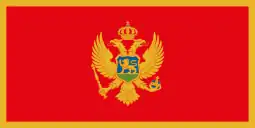
| |
| Participating broadcaster | Radio i Televizija Crne Gore (RTCG) |
| Participation summary | |
| Appearances | 12 (2 finals) |
| First appearance | 2007 |
| Last appearance | 2022 |
| Highest placement | 13th: 2015 |
| External links | |
| Montenegro's page at Eurovision.tv | |
Montenegro in the Eurovision Song Contest 2022 | |
Montenegro has participated in the Eurovision Song Contest 12 times since its debut in 2007. Previously it had participated as part of Yugoslavia (both the Socialist Federal Republic of Yugoslavia from 1961 to 1991 and the Federal Republic of Yugoslavia in 1992) and as part of Serbia and Montenegro (from 2004 to 2006).
The 2005 entrants from Serbia and Montenegro, No Name, were from Montenegro, as were the 1983 and 1984 entrants for Yugoslavia.
History
Before Montenegro became an independent country on 3 June 2006, the country had participated as part of Yugoslavia and later Serbia and Montenegro. Entries from Montenegro also placed 4th in 1983 and 18th in 1984 as part of Yugoslavia, and 7th in 2005 as part of Serbia and Montenegro. Montenegrin broadcaster Radio and Television of Montenegro (RTCG) organised the national final MontenegroSong to select the country's entries in 2007 and 2008, and internally selected the entry in 2009.
As an independent country, Montenegro failed to qualify for the grand final during its debut in 2007, as well as its appearances in 2008 and 2009. The country placed 11th in the first semi-final in 2009, their best result at the time, with "Just Get Out of My Life" performed by Andrea Demirović. In November 2009, RTCG announced that Montenegro would withdraw from the 2010 contest due to financial difficulties.[1] Despite not participating, RTCG still broadcast the contest. RTCG applied to participate in the 2011 contest, but with the caveat that the potential representative would have to find sponsors to fund their participation themselves.[2] As that did not come to fruition, in December 2010, Montenegro decided to not participate in the contest on financial grounds.[3]
On 20 November 2011 the head of RTCG revealed that Montenegro would participate in the 2012 contest to be held in Baku; he also went on to say that he saw Montenegro at every Eurovision Song Contest to come.[4] Montenegro returned to the contest in 2012, again internally selecting their entry, "Euro Neuro" performed by Rambo Amadeus, which failed to qualify from the first semi-final. In 2013, Montenegro internally selected Who See and Nina Žižić with the song "Igranka", and failed to qualify. In 2014, Montenegro qualified for the grand final for the first time in its history with Sergej Ćetković's "Moj svijet". In 2015, Montenegro again qualified for the grand final with "Adio", performed by Knez and composed by Željko Joksimović. The song achieved the best Montenegrin result up to that time, finishing in 13th place. In 2016, RTCG selected Highway and their song "The Real Thing" internally. They performed in the first semi-final but the song failed to qualify, placing 13th with 60 points. In 2017, RTCG selected Slavko Kalezić and his song "Space" internally. The song failed to qualify, placing 16th. In 2018, RTCG organised the national final Montevizija to select their entry,[5] which was won by "Inje" performed by Vanja Radovanović.[6] The song failed to qualify from the second semi-final, placing 16th with 40 points. In 2019, RTCG again selected its representative through Montevizija,[7] which was won by "Heaven" performed by D mol.[8] The song failed to qualify from the first semi-final, placing 16th with 46 points.
Despite initially confirming their participation in the 2020 contest and aiming to expand Montevizija,[9][10] Montenegro ultimately did not enter the contest, which was later cancelled as a result of the COVID-19 pandemic.[11] RTCG later stated that the reason was due to "modest results" and financial issues.[12] Montenegro also did not participate in the 2021 contest, but returned in 2022, having internally selected Vladana to represent the country with the song "Breathe".[13][14] Once again, Montenegro failed to qualify for the final, finishing 17th in a field of 18 with 33 points in the second semi-final. RTCG later confirmed its absence from the 2023 contest, citing financial constraints and a lack of interest from sponsors.[15] On 3 October 2023, local media in Montenegro reported that the country would not return to the 2024 contest in Malmö.[16] Montenegro ultimately did not appear on the list of participants for 2024, marking a second consecutive absence from the contest. On 5 January 2024, RTCG published a report from a public debate held on 4 December 2023 concerning their production plans for 2024. In the report, the broadcaster states that it "plans on organising a music festival to promote Montenegrin artists and authors, and which would (depending on the budget) be used as a way to select the representative for Eurovision 2025".[17][18]
Participation overview
Prior to Yugoslavia and Serbia and Montenegro's dissolution, artists from the Montenegrin federal unit represented Yugoslavia in 1983, 1984, and Serbia and Montenegro as a republic unit in 2005, as well as being intended to compete in 2006, where they withdrew.
| Year | Artist | Song | Language | Final | Points | Semi | Points |
|---|---|---|---|---|---|---|---|
| 2007 | Stevan Faddy | "'Ajde, kroči" ('Ајде, крочи) | Montenegrin | Failed to qualify | 22 | 33 | |
| 2008 | Stefan Filipović | "Zauvijek volim te" (Заувијек волим те) | Montenegrin | 14 | 23 | ||
| 2009 | Andrea Demirović | "Just Get Out of My Life" | English | 11 | 44 | ||
| 2012 | Rambo Amadeus | "Euro Neuro" | English[lower-alpha 1] | 15 | 20 | ||
| 2013 | Who See[lower-alpha 2] | "Igranka" (Игранка) | Montenegrin | 12 | 41 | ||
| 2014 | Sergej Ćetković | "Moj svijet" (Мој свијет) | Montenegrin | 19 | 37 | 7 | 63 |
| 2015 | Knez | "Adio" (Адио) | Montenegrin | 13 | 44 | 9 | 57 |
| 2016 | Highway | "The Real Thing" | English | Failed to qualify | 13 | 60 | |
| 2017 | Slavko Kalezić | "Space" | English | 16 | 56 | ||
| 2018 | Vanja Radovanović | "Inje" (Иње) | Montenegrin | 16 | 40 | ||
| 2019 | D mol | "Heaven" | English | 16 | 46 | ||
| 2022 | Vladana | "Breathe" | English, Italian | 17 | 33 | ||
Awards
Barbara Dex Award
The Barbara Dex Award was an annually awarded, fan-voted accolade for the "worst dressed" artists in the Eurovision Song Contest.[19]
| Year | Performer | Host city | Ref. |
|---|---|---|---|
| 2017 | Slavko Kalezić |
Related involvement
Heads of delegation
The public broadcaster of each participating country in the Eurovision Song Contest assigns a head of delegation as the EBU's contact person and the leader of their delegation at the event. The delegation, whose size can greatly vary, includes a head of press, the contestants, songwriters, composers and backing vocalists, among others.[21]
| Year | Head of delegation | Ref. |
|---|---|---|
| 2017 | Sabrija Vulić | |
| 2018 | Nataša Baranin | |
| 2019 | Sabrija Vulić |
Commentators and spokespersons
| Year | Television | Radio | Spokesperson | Ref. | ||
|---|---|---|---|---|---|---|
| Commentator | Channel | Commentator | Channel | |||
| 2007 | Dražen Bauković, Tamara Ivanković | TVCG 2 | No broadcast | Vidak Latković | ||
| 2008 | Nina Radulović | |||||
| 2009 | Jovana Vukčević | |||||
| 2010 | Did not participate | |||||
| 2011 | No broadcast | |||||
| 2012 | Dražen Bauković, Tamara Ivanković | TVCG 1 | Marija Marković | |||
| 2013 | Sonja Savović, Sanja Pejović | Radio Crne Gore, Radio 98 | Ivana Sebek | |||
| 2014 | Tijana Mišković | |||||
| 2015 | Dražen Bauković, Tijana Mišković | TVCG 2 | No broadcast | Andrea Demirović | ||
| 2016 | TVCG 1, TVCG SAT | Danijel Alibabić | ||||
| 2017 | Tijana Mišković | |||||
| 2018 | Nataša Šotra | |||||
| 2019 | Ajda Šufta | |||||
| 2021 | No broadcast | Did not participate | ||||
| 2022 | Dražen Bauković, Tijana Mišković | TVCG 1, TVCG SAT | Andrijana Vešović | |||
| 2023 | TVCG 2 | Did not participate | ||||
| 2024 | TBA | |||||
- From 1961 until 1992, Montenegro competed as part of Yugoslavia and from 2004 to 2005 as part of Serbia and Montenegro.
Gallery
 Stevan Faddy in Helsinki (2007)
Stevan Faddy in Helsinki (2007) Stefan Filipović in Belgrade (2008)
Stefan Filipović in Belgrade (2008) Andrea Demirović in Moscow (2009)
Andrea Demirović in Moscow (2009)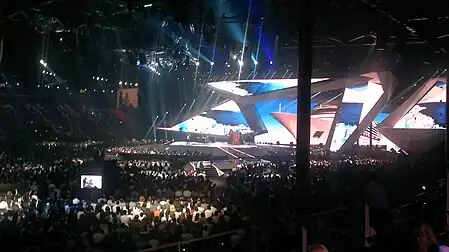 Rambo Amadeus in Baku (2012)
Rambo Amadeus in Baku (2012)
 Sergej Ćetković in Copenhagen (2014)
Sergej Ćetković in Copenhagen (2014)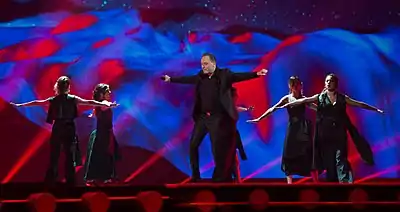
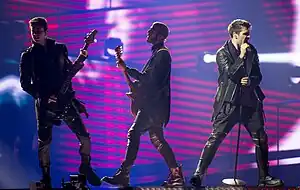
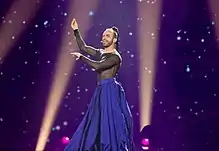 Slavko Kalezić in Kyiv (2017)
Slavko Kalezić in Kyiv (2017) Vanja Radovanović in Lisbon (2018)
Vanja Radovanović in Lisbon (2018)

See also
Notes and references
Notes
- ↑ Contains some phrases in Montenegrin and German
- ↑ Performance contains uncredited live vocals from Nina Žižić
References
- ↑ Hondal, Victor (2009-11-17). "Montenegro withdraws from Eurovision 2010". ESCToday. Retrieved 2009-11-17.
- 1 2 Hondal, Victor (4 December 2010). "Montenegro applied for Eurovision 2011". esctoday.com. Retrieved 15 November 2019.
- ↑ Hondal, Victor (2009-12-23). "Montenegro officially out of Eurovision 2011". ESCToday. Retrieved 2009-12-23.
- ↑ Granger, Anthony (2011-11-30). "Montenegro confirms for Baku". Eurovoix. Retrieved 30 November 2011.
- ↑ Herbert, Emily (18 October 2017). "Montenegro: National Final To Select Eurovision 2018 Participant". eurovoix.com. Retrieved 15 November 2019.
- ↑ Herbert, Emily (17 February 2018). "Montenegro: Vanja Radovanović to Eurovision 2018". eurovoix.com. Retrieved 15 November 2019.
- ↑ Granger, Anthony (31 October 2018). "Montenegro: Public Will Select Eurovision 2019 Entry". eurovoix.com. Retrieved 15 November 2019.
- ↑ Granger, Anthony (9 February 2019). "Montenegro: D-Moll Selected For Eurovision Song Contest 2019". eurovoix.com. Retrieved 15 November 2019.
- 1 2 Farren, Neil (24 September 2019). "Montenegro: Eurovision 2020 Participation Confirmed". eurovoix.com. Retrieved 14 November 2019.
- ↑ Granger, Anthony (12 May 2019). "Montenegro: Aims For Expanded Montevizija in 2020". eurovoix.com. Retrieved 14 November 2019.
- ↑ Herbert, Emily (13 November 2019). "41 Countries Will Participate in The Eurovision Song Contest 2020". eurovoix.com. Retrieved 14 November 2019.
- ↑ Jiandani, Sanjay (15 November 2019). "Montenegro: RTCG releases a statement regarding its Eurovision withdrawal". esctoday.com.
- ↑ Jiandani, Sanjay (2021-10-12). "Montenegro: RTCG confirms participation at Eurovision 2022". ESCToday.
- ↑ Avelino, Gerry (2022-01-04). "🇲🇪 Montenegro: Vladana Vučinić to Eurovision 2022". Eurovoix. Retrieved 2022-01-04.
- ↑ Granger, Anthony (13 October 2022). "Montenegro: RTCG Will Not Compete in Eurovision 2023". Eurovoix. Retrieved 13 October 2022.
- ↑ Stephenson, James (3 October 2023). "🇲🇪 Montenegro: Report Says Montenegro Will Not Enter Eurovision 2024". Eurovoix. Retrieved 10 January 2024.
- ↑ "Izvještaj o sprovedenoj raspravi na Nacrt produkcijskih planova Radija, Televizije i Portala za 2024. godinu" [Report on the debate on the Draft Program Production Plans of Radio, Television and Portal for 2024] (PDF) (in Montenegrin). Radio Television of Montenegro. 2024-01-05. Retrieved 2024-01-06.
- ↑ Maldonado, Yesaac (2024-01-06). "Montenegro: Eyes Possible Eurovision Return in 2025". Eurovoix. Retrieved 2024-01-06.
- ↑ Backer, Stina (25 May 2012). "Forgettable song, memorable outfit: The crazy clothes of Eurovision". CNN. Archived from the original on 27 May 2018. Retrieved 26 May 2018.
- ↑ Adams, William Lee (21 May 2017). "Eurovision's worst dressed? Montenegro's Slavko Kalezic wins Barbara Dex Award 2017". Wiwibloggs. Retrieved 8 December 2019.
- ↑ "Heads of Delegation". European Broadcasting Union. Retrieved 27 May 2019.
- 1 2 Granger, Anthony (21 January 2018). "Montenegro: Nataša Baranin New Head of Delegation". eurovoix.com. Retrieved 6 December 2019.
- ↑ Viniker, Barry (12 March 2007). "The voting running order revealed". esctoday.com. Archived from the original on 14 March 2007. Retrieved 16 November 2019.
- ↑ "Sumnja od Jugolasvenskog glasanja". evropesma.org. Archived from the original on 8 April 2012. Retrieved 16 November 2019.
- ↑ "Sumnja od Jugolasvenskog glasanja". evropesma.org. 8 September 2011. Archived from the original on 8 April 2012. Retrieved 16 November 2019.
- ↑ "Running order for the voting tonight". eurovision.tv. EBU. 26 May 2012. Archived from the original on 18 June 2012.
- 1 2 Vučinić, Nada (14 May 2013). "Večernji program" [Evening program] (in Montenegrin). RTCG. Archived from the original on 2 May 2013. Retrieved 16 November 2019.
- ↑ Roxburgh, Gordon (18 May 2013). ""Good evening Malmö" - Voting order revealed". eurovision.tv. EBU. Archived from the original on 19 May 2013. Retrieved 16 November 2019.
- ↑ Roxburgh, Gordon (10 May 2014). ""Good evening Copenhagen" - Voting order revealed". eurovision.tv. EBU. Archived from the original on 13 May 2014. Retrieved 16 November 2019.
- ↑ "Eurosong". TVCG. 22 May 2015. Retrieved 16 November 2019.
- ↑ Roxburgh, Gordon (23 May 2015). ""Good evening Vienna" – Voting order revealed". Eurovision Song Contest. Archived from the original on 24 May 2015. Retrieved 16 November 2019.
- ↑ "Eurosong 2016". rtcg.me (in Montenegrin). RTCG. 10 May 2016. Retrieved 16 November 2019.
- ↑ Roxburgh, Gordon (14 May 2016). "The 42 spokespersons for the 2016 Grand Final". eurovision.tv. EBU. Archived from the original on 15 May 2016. Retrieved 16 November 2019.
- ↑ "Eurosong 2017". rtcg.me (in Montenegrin). RTCG. 8 May 2017. Retrieved 16 November 2019.
- ↑ Jensen, Charlotte (13 May 2017). "Voting order, spokespeople for Grand Final 2017". eurovisionary.com. Eurovisionary. Retrieved 16 November 2019.
- ↑ "Lisabon – Evrovizija 2018". rtcg.me (in Montenegrin). RTCG. 9 May 2018. Retrieved 16 November 2019.
- ↑ "May we have your votes please?". eurovision.tv. EBU. 11 May 2018. Retrieved 16 November 2019.
- ↑ "Tel Aviv – Evrovizija 2019". rtcg.me (in Montenegrin). RTCG. 14 May 2019. Archived from the original on 14 May 2019. Retrieved 16 November 2019.
- ↑ "Eurovision 2019 Spokespersons – Who will announce the points?". eurovisionworld.com. 18 May 2019. Retrieved 16 November 2019.
- ↑ Granger, Anthony (2021-05-19). "Montenegro: RTCG Will Not Broadcast Eurovision 2021". Eurovoix. Retrieved 2021-05-19.
- ↑ van Waarden, Franciska (2022-04-23). "Montenegro: Zombijana Bones Confirmed as Spokesperson for the Grand Final". Eurovoix. Retrieved 2022-04-23.
- ↑ "Programska šema" (in Montenegrin). RTCG. Retrieved 4 May 2023.
- ↑ Granger, Anthony (2023-05-08). "Montenegro: RTCG Broadcasting Eurovision 2023". Eurovoix. Retrieved 2023-05-08.
- ↑ Ibrayeva, Laura (2024-01-07). "Montenegro: RTCG Intends to Broadcast Eurovision & Junior Eurovision 2024". Eurovoix. Retrieved 2024-01-10.